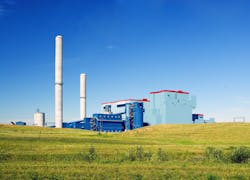Capital Power, Mitsubishi and Kiewit groups conducting Carbon Capture study in Canada
Power generator Capital Power is working with the Mitsubishi Heavy Industries Group and the Kiewit Energy Group on a front-end engineering and design (FEED) study for the Genesee CCS Project in Alberta.
MHI Group is the technology licensor for the study, providing its Advanced KM CDR ProcessT as the basis for carbon capture technology. This CO2 capture technology uses an updated KS-21 amine-based solvent technology for efficient and effective capture of carbon from the flue gas stream.
The goal of the $30 million project is to capture about three million tons of carbon dioxide per year from the exhaust gas at Capital Power's Genesee Generating Station power plant. Genesee burns coal and natural gas to create electricity.
MHI Group is working on the next stage of the engineering and design for the project alongside Kiewit.
The FEED study will establish the performance expectations for the project, set fundamental engineering deliverables and define the preliminary design for integrating the project with repowered units. It will also help determine a class 2 capital cost estimate for this project.
“The Project will have a tremendous impact on the decarbonization of the facility and advance the CCS industry as a whole,” Rob Medley, Vice President at Kiewit, said.
The study is conducted alongside the engineering work to advance the Open Access Wabamun Carbon Hub, which is slated for completion by June 2023. Black and Veatch is providing the engineering oversight on behalf of Capital Power for the study.
“We are proud to collaborate with Capital Power and Kiewit on this world leading project,” said Kenji Terasawa, President & CEO, Mitsubishi Heavy Industries Engineering. “We recognize Canada as highly proactive in pursuing environmental protection and is a promising market for decarbonization, and as an innovative solution provider, MHI Group is taking action to achieve a carbon neutral society by introducing our carbon capture technology. To realize this goal, we will work diligently with our partners to bring this project to fruition.”
A final investment decision on the project is expected by mid-2023, subject to the fulfilment of certain conditions, including regulatory certainty on investment tax credits, carbon pricing and additional funding mechanisms. The project is expected to complete and begin operation as early as 2027.
About the Author
EnergyTech Staff
Rod Walton is head of content for EnergyTech.com. He has spent 17 years covering the energy industry as a newspaper and trade journalist.
Walton formerly was energy writer and business editor at the Tulsa World. Later, he spent six years covering the electricity power sector for Pennwell and Clarion Events. He joined Endeavor and EnergyTech in November 2021.
He can be reached at [email protected].
EnergyTech is focused on the mission critical and large-scale energy users and their sustainability and resiliency goals. These include the commercial and industrial sectors, as well as the military, universities, data centers and microgrids.
Many large-scale energy users such as Fortune 500 companies, and mission-critical users such as military bases, universities, healthcare facilities, public safety and data centers, shifting their energy priorities to reach net-zero carbon goals within the coming decades. These include plans for renewable energy power purchase agreements, but also on-site resiliency projects such as microgrids, combined heat and power, rooftop solar, energy storage, digitalization and building efficiency upgrades.
